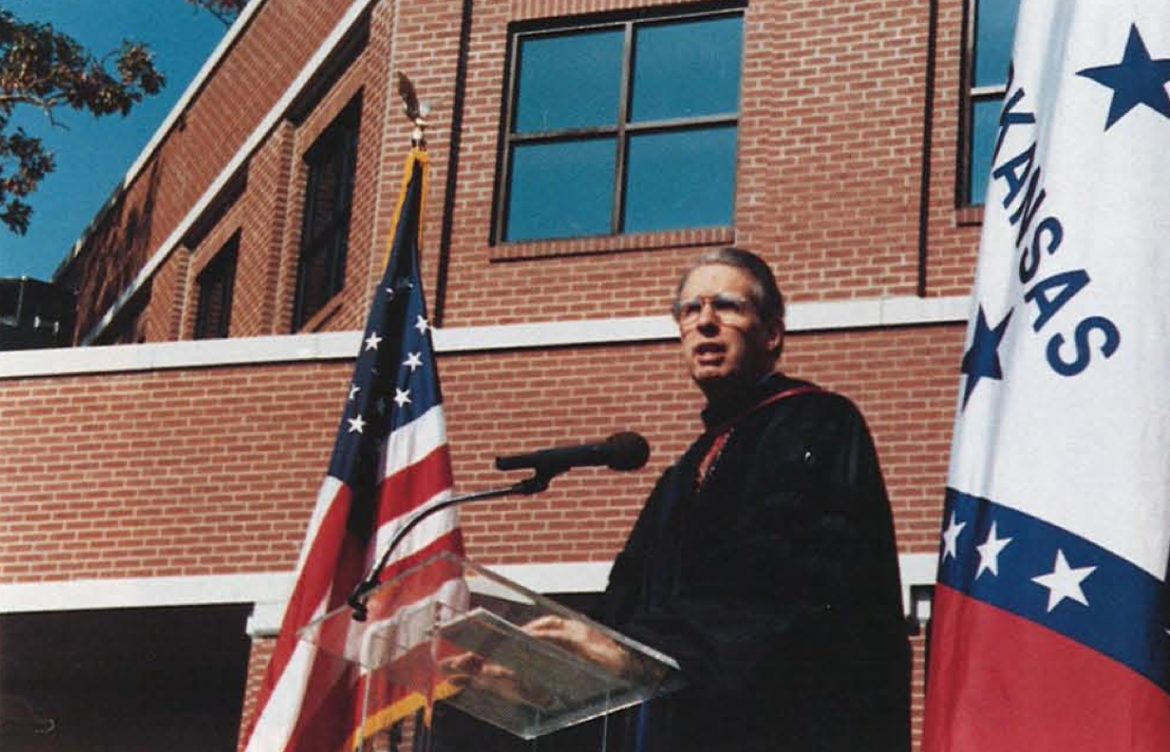Part 2: Dr. Burks helps make room for students on campus and across the world
Student enrollment at Harding increased each year from 1992-1996, just as it has every year since Dr. David Burks became Harding’s fourth president in 1987. Burks said the constant growth over the years was very intentional, caused by a new emphasis placed on the admissions program, and helped the university to increase its funding while impacting more people with its Christian mission.
“I’ve always said that enrollment is life,” Burks said. “We don’t have a large endowment, so we are very tuition driven. Consequently, enrollment is a very important factor.”
Still, Burks said, with the constant growth came the need to continually update and add buildings to campus. He said the most significant of these additions, for him, came in 1994 when he had the chance to dedicate the new Jim Bill McInteer Center for Bible and World Missions.
“If I had to just name the most significant event in the last 26 years in terms of the campus, or just what touches me, it was the dedication of the McInteer Center,” Burks said. “This had been my dream since I first became president, to find a way to raise money with the help of other people and build a new, state-of-the-art Bible center. I thought that it was the most important building on campus.”
Until Burks and the board decided to pursue building the McInteer, the Bible program primarily met in the Ezell Building, although some classes were scattered across campus. Dr. Paul Pollard, a professor in New Testament and Greek, said the addition of the McInteer symbolized Burks’ priorities and made life easier for students and faculty alike.
“Burks has always been a great leader with vision and passion for the cause of Christ,” Pollard said. “The construction of the new Bible building showed in a concrete way where his heart was. It does not seem possible that almost 19 years have passed since we all turned out in front of the newly finished McInteer Bible building for the grand official opening. While it was being built, the Bible faculty came over and walked around inside the skeleton of the building, dreaming of the day that it would be open for classes. The old Ezell Bible building was simply too small for the expanding student body and the need was great for a centralized location.”
David Rubio (’95), who served as SA Vice President during the 1993-1994 school year, said the McInteer and the new plaza and fountain in front, which replaced a once busy street running from the American Heritage Center to the Mabee Business Building, offered students a professional and social environment that energized the Bible program.
“I was there the day the new Bible building was dedicated,” Rubio said. “I spent my last year at Harding attending classes in it. It was awesome. It — especially the rotunda and the fountain in front — became a real attraction, a place for people to meet before heading somewhere or just a place to walk, relax, read, be inspired. Also, for us students, it gave the Bible department a real shot in the arm, it seemed to me; a kind of professional legitimacy to this subject that we knew was at the heart of what the school was all about.”
Other updates to campus during this period included building new parking lots; renovating the Administration Building, the student center and the American Studies Building; and approval for Searcy Hall and the Village apartments to be built.
Burks said he was also proud of Harding’s expansions of its overseas programs during this time, including the addition of programs in Greece and London in 1993, and in Australia in 1996. Today, he said, depending on how departmental programs are counted, Harding offers eight overseas programs, compared to only one in Florence when he first came to office.
“I was and still am a very big proponent of that experience,” Burks said. “Greece was big to me, it was something I always wanted to do because people get to go to Israel, they get to go to the holy land, they go to Turkey, they go to the seven churches, they go all over Greece. When you go to the holy land, for the most part, you see retired people. Now I’m tickled to death that they get to see it, but wouldn’t it be wonderful to get to see it when you’re 20?”
Freshman Richard Hale, a Bible major who is currently in Greece with the HUG program, said Burks’ push to expand Harding’s international programs has a lasting impact on students today.
“Dr. Burks creating the HUG program is one of the best things he did for Harding,” Hale said. “Especially being a Bible major, experiencing everything through the HUG program is a life changer and major faith builder.”
During the years 1992-1996, Harding received its own zip code, began a recycling program, started new majors in international business and art therapy and added a Master of Science degree in marriage and family therapy. It entered NCAA Division II, split its math and computer science programs into two separate departments and got Internet access for the first time. Still, Burks said, the lasting effects of Harding’s growth on the students themselves have always been the most important thing.
“The theme for the whole 26 years would be growth,” Burks said. “We exist for the idea of transforming people to accept Jesus Christ. Well you can’t have any impact on people if they are not here, so I’ve always been a big proponent of growth. If we can do it the right way, let’s make Christian education available to more people.”
